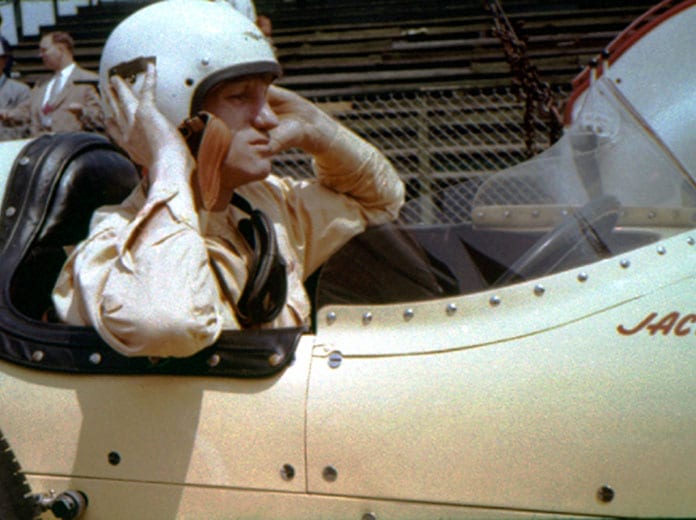Jack McGrath didn’t need to drive race cars.
Unlike many of his peers who turned to racing during the Great Depression to put food on the table, McGrath had no such concerns. His family was wealthy.
McGrath’s father fully expected his son to join him in the family business, a meat processing plant in Los Angeles.
McGrath had other ideas, however. Auto racing captured his passion. It seduced him, fulfilled him and eventually killed him.
His infatuation was ignited by a fascination with cars. During his early teens, he laboriously rebuilt a $15 junkyard Model T.
“I got it running great,” McGrath told writer John Painter. “But my father wouldn’t let me drive it on the street. The only place I could ever give it a ride was around the plant’s yard.”
As much as McGrath’s father detested his tinkering with cars, his loathing erupted when McGrath began racing. A grievous rift resulted and years passed without father and son speaking.
In 1935, the 16-year-old modified a ’29 Ford roadster to run on the Muroc Dry Lakes. He hustled it to 100 mph. When more success followed, he opened a speed shop to provide engines to Los Angeles hot rodders.
World War II curtailed racing, but after the war McGrath became immersed in going fast. His reputation grew, catching West Coast promoter Bill White’s attention. In mid-1945, White offered McGrath a ride in his track roadster.
It was his first closed-course competition and he took to it instinctively. In 1946, McGrath won the first CRA championship and repeated as the organization’s champion in ’47. Along with the roadsters, he dabbled in sprint cars and midgets — and won in them.
In May 1947, barely 18 months after his first oval race, McGrath appeared at Indianapolis Motor Speedway, seeking a ride. AAA officials gave a startled glance at his thin résumé and sent him home.
McGrath turned to his hero, Rex Mays, “… I wish I could be like him,” he once said. Mays found him an AAA sprint car ride. McGrath capitalized on the opportunity, gained experience on the Championship Trail and qualified for the 1948 Indianapolis 500.
In 1949, McGrath arrived at Indianapolis in the little-regarded City of Tacoma Special. He put the car on the front row, the first of six front-row starts, five consecutive, in his eight Indianapolis 500s.
McGrath certainly knew how to get around the speedway. Explaining McGrath’s touch at Indy, his longtime mechanic Jack Beckley said, “He loved high speed. Many guys thought they wanted to run there, but once they saw those long straights they had second thoughts. Not Jack.”

For 1950, Kansas oil millionaire and car owner Jack Hinkle signed McGrath and Beckley. McGrath never drove for another owner.
Nicknamed the “Three Jacks,” the team was one of the best of the era. McGrath won at Pennsylvania’s Langhorne Speedway and the New York State Fairgrounds in 1950, and in six seasons claimed four championship wins, 26 top-five finishes and nine poles.
The one win McGrath never managed, however, was the one he most wanted — Indianapolis. He had front-row starts in 1951, ’52, ’53 and the pole with a track record in ’54. But nagging problems stopped him short of victory.
In 1955, again a favorite for the win, he charged from the front row only to be challenged by Bill Vukovich on lap four. What ensued was one of the most intense battles in Indianapolis history. For 54 laps, neither backed off.
Then, suddenly, McGrath was in the pits with the hood up. He was out of the race.
Three laps later he watched with a stunned crowd as Vukovich perished in a multi-car accident on the backstretch.
McGrath reconciled with his dad and intended to drive for Vuky’s crack mechanics Jim Travers and Frank Coon in 1956. With their mechanical expertise and McGrath’s uncanny talent, it was a dream scenario that could have led to Indianapolis glory.
But racing is a tragic sport and McGrath was killed in a wild accident on Nov. 6, 1955 at the Arizona State Fairgrounds.
